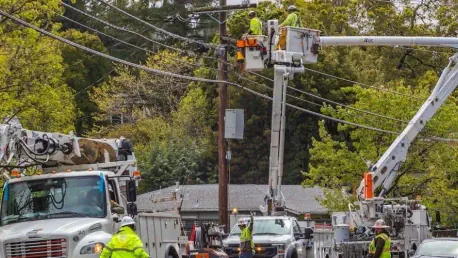As the upcoming legislative session in New Hampshire looms, a significant debate is brewing over who should control energy policy in the state. The Public Utilities Commission (PUC) and the Department of Energy (DOE) are at the center of this contention, with the Office of the Consumer Advocate (OCA) playing a critical role in the discourse. This debate highlights the need for clarity in the delineation of authority between these institutions and raises crucial questions about the future of energy policy and ratepayer advocacy in New Hampshire.
The Role of the Public Utilities Commission (PUC)
The PUC, a three-member body, is responsible for regulating utilities in New Hampshire, ensuring that services are provided safely, reliably, and at reasonable rates. The Commission is tasked with not just overseeing utility operations but also adjudicating disputes and enforcing compliance with various state laws and regulations. However, concerns have grown that the PUC’s role has become confused and overly broad due to certain statutes misappropriating enforcement responsibilities to the Commission, which should primarily focus on adjudicatory responsibilities.
Daniel C. Goldner, Chair of the PUC, along with Commissioner Pradip K. Chattopadhyay, has expressed serious concerns regarding some of the recommendations put forth that could potentially strip the PUC of certain authorities. They argue that diminishing the Commission’s regulatory role could harm public interest by weakening its capacity to effectively oversee utilities. The PUC’s recent decision on net metering, which disregarded a settlement agreement reached between multiple parties including ratepayer advocates and utilities, underscores the necessity for a clear distinction and understanding of roles and responsibilities.
The Emergence of the Department of Energy (DOE)
The DOE was established in 2021 as a state agency with the mission to oversee energy policy and ensure the efficient use of energy resources within New Hampshire. Originally supported by Donald Kreis, the state’s consumer advocate, the DOE was envisioned as a mechanism to streamline energy policy and minimize redundancy. However, overlapping authorities between the PUC and DOE have led to increasing confusion and inefficiencies in handling energy policy and enforcement.
The DOE’s role in enforcing energy policy is crucial for shaping the state’s energy future. Nevertheless, the lack of clear delineation between the DOE and PUC has caused complications that could ultimately impact ratepayers negatively. Christopher J. Ellms Jr., Deputy Commissioner of the DOE, has emphasized the agency’s intention to review legislative proposals and provide positions during hearings. He refrained from commenting on specific recommendations made by the OCA, highlighting the importance of thorough evaluation of forthcoming bills.
The Office of the Consumer Advocate (OCA) and Its Mandate
The OCA has long served as a dedicated advocate for residential ratepayers in utility matters, striving to ensure that their interests are well-represented. Donald Kreis, the current consumer advocate, has been a staunch supporter of maintaining the OCA’s independence and the clarity of its role. Kreis argues that the OCA offers a unique and necessary voice for ratepayers, one that would be compromised if its responsibilities were transferred to the DOE, an executive branch agency.
Rep. Ross Berry has proposed eliminating the OCA and transferring its responsibilities to the DOE, arguing that a larger agency could more effectively prioritize residential ratepayers. However, this proposal has yet to be fully discussed with either the OCA or DOE, and Kreis remains skeptical about its potential impacts. He fears that aligning the OCA’s mandate with executive branch policies could undermine its independent stance, critical for unbiased ratepayer advocacy.
Legislative Efforts to Clarify Roles and Responsibilities
To address the confusion over roles and responsibilities, Rep. Thomas Cormen, along with Kreis, is working on drafting legislation aimed at redefining the PUC’s role. They argue that the PUC should serve primarily as an adjudicative body, with enforcement duties clearly assigned to the DOE. This legislative effort seeks to eliminate role overlaps and enhance the efficiency of both entities in fulfilling their respective mandates, ultimately benefiting ratepayers.
A noteworthy aspect of Cormen’s proposed legislation includes a provision requiring the PUC to accept unanimous agreements among parties without further deliberation. This idea is supported by Kreis, who believes that in cases where there is total consensus, the PUC should not second-guess the agreement. Additionally, Cormen has filed a bill request to clarify the authority of the PUC chair, emphasizing that any actions taken by the PUC should be approved through a majority vote from all commissioners, ensuring balanced decision-making.
The Impact of Political Dynamics
As New Hampshire gears up for its upcoming legislative session, there is a significant debate on who should oversee energy policy within the state. This controversy places the Public Utilities Commission (PUC) and the Department of Energy (DOE) in the spotlight, while the Office of the Consumer Advocate (OCA) plays a crucial role in the ongoing discussion. The heart of the issue revolves around the need to clearly define the areas of authority between these institutions. This debate sparks essential questions regarding the future direction of energy policy and the advocacy for ratepayers in New Hampshire. Clarity in the responsibility and power of each entity is necessary to effectively shape the state’s energy landscape, ensuring that ratepayer interests are protected and that energy policies are efficiently and transparently managed. Consequently, the outcome of this legislative session could significantly impact not only policy formulation but also the broader interests of the citizens as energy consumers.









